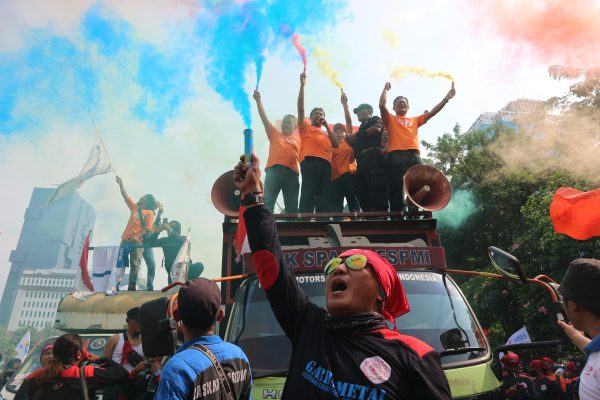The original budget for the fuel subsidy was increased from Rp 152 trillion (US$10 billion) to Rp 502 trillion (US$30 billion). According to Finance Minister Sri Mulyani, 65 and 73 per cent of the annual subsidy allocation for diesel and Pertalite respectively, had already been spent by July 2022. Without reform, the cost of the subsidy was expected to reach nearly Rp 700 trillion (US$46 billion).
This is not the first time Jokowi has cut the subsidy to free up fiscal space for his administration. He made cuts of a similar size just months after taking office in 2014. Jokowi is also not the first president to cut the subsidy amid increasing international prices — a practice adopted by every Indonesian president since Suharto. None have gone so far as to completely remove the inefficient and regressive policy.
As with all broad-based subsidies, a large share of the benefits go to the middle-class — a point that Jokowi was quick to make in justifying his decision. There is widespread concern that the subsidy cut, in combination with higher food prices and overall inflation, will have a devastating impact on the poor. But data from August 2022 showed a month-on-month core deflation which provided some strategic and political cover to the cut.
The widespread pushback against this liberalisation is indicative of the continued support for inefficient and protectionist economic policies in Indonesia. From expensive rice self-sufficiency initiatives that see the poorest Indonesians paying more for their staple food, to export bans and foreign investment restrictions, protectionism is widespread. Such policies gained traction in Indonesia — and the rest of the world — due to COVID-19 and the war in Ukraine.
Yet the costs of these protectionist policies are huge. Poorer Indonesians would be better protected through targeted economic relief, such as that provided at the height of the pandemic and promised in response to the fuel price increase.
Following the announcement, protests against fuel price hikes ensued in Jakarta and other major cities. Yet within the House of Representatives, only two political parties — the Prosperous Justice Party and the Democratic Party — opposed the price hike. These two opposition parties only hold 18 per cent of seats in the lower house, while the other 82 per cent unanimously support the decision.
Solid support from all coalition parties provides the much-needed political stability to proceed with the cut. Raising fuel prices in 2022 poses only a slight political risk for Jokowi, who cannot run for president in 2024.
Despite the protests, Jokowi still enjoys popular support. In September 2022, the president’s approval rating was 62.6 per cent, down almost 10 per cent from his 72.3 per cent rating in August before the subsidy cut. Despite the decrease, the rating still leaves Jokowi as one of the world’s most popular democratic leaders.
Jokowi also hopes that his social assistance program will provide some economic cushioning for Indonesians and political cushioning for his grand coalition. Government social security, especially cash transfers, have become the major driver of Jokowi’s popularity throughout his presidency.
The current scheme includes direct cash assistance for 20.65 million recipients and wage subsidy assistance for 16 million workers. Local governments are also set to receive funding to subsidise public transportation, ride-hail drivers and fishermen.
But the lack of government accountability mechanisms due to the large parliamentary coalition and declining confidence in constitutional checks and balances could lead to an ineffective social assistance program. Several social assistance corruption scandals have also shown the importance of safeguarding the implementation process of such policies.
Importantly, the subsidy cut also brings Indonesian fuel prices closer to the true economic and social cost of fuel consumption. This slightly levels the playing field for green and renewable energy alternatives. The Indonesian government should continue to reduce support for dirty energy sectors to encourage a smooth green economy transition.
Indonesia is working hard to establish electric car manufacturing, but the lack of charging stations and other facilities, combined with cheap combustion fuel are hindering their domestic uptake. Not long after implementing the fuel subsidy cut, Jokowi signed a presidential instruction mandating the use of electric vehicles by government officials.
The savings from the subsidy can — and should — be spent on sustainable alternatives, such as extensive public transportation and targeted social assistance. Yet there is fear that the money will instead be spent on Jokowi’s legacy project — the new capital Nusantara.
Charlie Barnes is an editorial staff member at East Asia Forum. He is the 2022 New Colombo Plan Indonesia Fellow.
Rania Teguh is Research Assistant at the Centre for Strategic and International Studies (CSIS), Indonesia and an economics student at The Australian National University.

